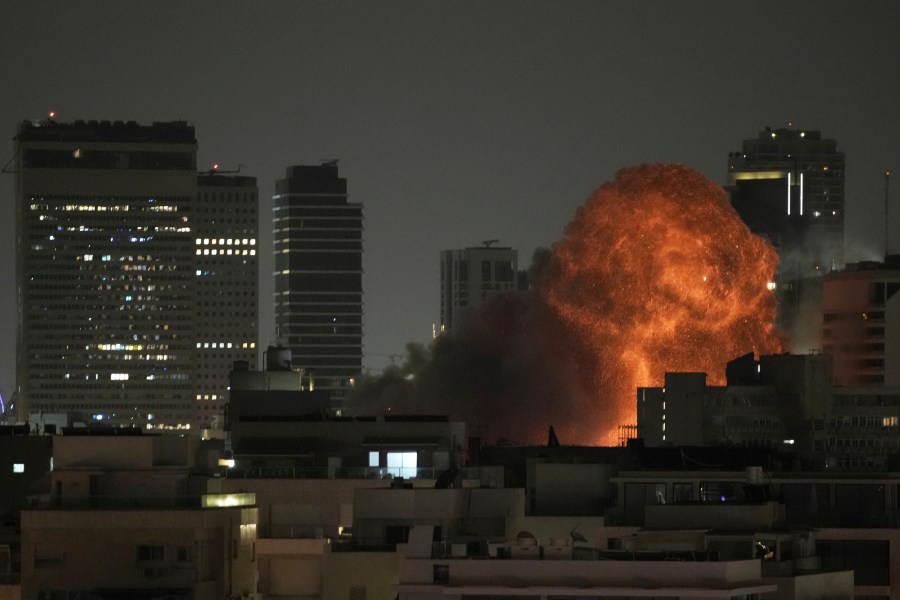COLUMBUS, Ohio (WCMH) – Airstrikes have rained down on Tel Aviv, Israel for the last three nights. The conflict between Iran and Israel has intensified after nuclear talks were called off.
Inside the city of Tel Aviv, former Columbus resident Jack Chomsky huddled inside the bomb shelter, or “miklat” in Hebrew.
“It is now Sunday evening at 10 and in the last hour and a half, we entered the room that I’m in now, which we call in Hebrew, a miklat, which means a shelter,” he said via Zoom on Sunday afternoon around 3 p.m. Eastern Time.
The former Cantor at Congregation Tifereth Israel in Columbus now has a new home in Tel Aviv.
“I’m in the room right now because this is the convenient place for me to talk to you,” he said to NBC4 reporter Kyle Beachy. “We were in this room because missiles were coming, from about, I think it may have been about, from, let’s say, from 8:45 to 9:30 or something. People who are in their shelters are basically safe. There are some people who died, some people who were injured and from what I understand, it’s people who were not in their shelters. Now, it may be that they had no way to get to shelter.”
Chomsky and wife Susan Gellman first spoke with NBC4 in October 2023, the day after the horrific Hamas attack in southern Israel. More than 600 days have passed since that attack, and while a new conflict has erupted, those impacted by the attacks over a year and a half ago are fresh on their minds.
“We have these people in our minds, in our hearts, every day,” Chomsky said. “This is wrong. It’s damaging. It’s terrible what’s happening to those people and it doesn’t benefit my people.”
They have grown accustomed to alerts on their phones and sirens wailing outside warning of incoming missiles. This week, many of those missiles have evaded Israeli defenses.
“Our closest friends here live less than a kilometer away,” Chomsky said. “They lived in a, and a in a tall, set of apartment buildings, which took a hit on the 10th floor, and they live on the 29th floor and they had to evacuate their building. Now, I don’t know when they’re going to be able to get back into their building. It was a terrifying thing. On the other hand, there, OK, they were then able to get their car and drive into the country where their daughter lives and stay there, where there have also been missile alerts.”
Even between warnings of incoming attacks, Chomsky is glad to be where he is, a testament to the people of his country.
“Although these are hard times, you know, I’ve been in this shelter five times in the last two or three days, yet one of the things that we really feel is that we are so glad that we are here and not stuck outside the land of Israel,” he said. “We have a firmly established a military here that will save our place, save our people, and hopefully we can have the leaders, including from beyond our own government, who will work together to take us forward.”
He said he can see the care people have for one another on display when his good friends were forced from their home.
“When they got to the street, there were people there already with hotel rooms for the people who were coming out of the building,” he said.
It’s all part of a different culture that Chomsky said is largely absent from his experience in the United States.
“The idea that your problem is your problem is not something that really makes sense here,” he said. “We belong to each other.”
Chomsky recalled many trips to the park in Tel Aviv with his family and grandson.
“I had a great life in Columbus, serving my congregation,” he said. “My community was fantastic, I loved it, I wasn’t anxious to leave, but then I came here. I did that for almost 40 years, and it was really all to lead me right to this place and the way things are here. If there are toys around, any kid can play with anybody else’s toy and, and if your kid wanders away from you a little bit and you’re not sure where they are, that’s not a cause for concern. Because everybody’s kid is everybody’s kid. And that’s something that I never I never felt in the U.S.. So, it’s pretty great.”
That sense of community is what drives Chomsky to continue to push for peace in Gaza, and a resolution to the conflict with Iran.
“Almost everyone has felt that this conflict would turn into a military encounter at some point,” Chomsky said. “It’s one that we had a lot of fear about. I’m among many people who hope, not that we want to destroy Iran, but we would like there to be a better, opportune amnesty for the people of Iran to have a better, a better country with better leaders. I would like for there to be a Palestine. I work toward there being a Palestine. I have, in the last, four months, I’ve been involved in a group that does a lot of work listening to, Palestinians here. And there are people, there are the people who are here, to nurture the Palestine that they need and that we need. But there are people who don’t want to see that happen. We both peoples have great stories about how we came to be here or how we’ve been here for a long time. And those stories can coexist beautifully. It’s not easy, but that’s the work we should be doing.”
Chomsky maintains a hopeful and positive outlook, despite the destruction around him. Having lived his life in the United States and in Israel, he has a unique and fresh perspective on the conflicts both nations are facing.
“I worry in some ways more about the old country, about what’s going on in the United States than I do about what’s happening here,” he said. “So, I appreciate that everyone should look at their neighbor. Put the newspaper down and see the person, and, and try and build together what is possible in a time of great shouting and anger. Just calm down somewhat and figure out what can I do right now to make things just a little bit better right here?”
He had a message for the folks of central Ohio as they watch this war from afar.
“I would just encourage people not to try and win an argument, but to figure out what can I do today to help people live together,” he said. “It is really much better to try to figure out how to make a positive contribution to what is here, what is right in front of us, what is within reach, rather than to try and win an argument. What happens and you see this also in the U.S. on issues is once you say certain magic words, now you’re no longer having a conversation and you’re just having an argument about the word that you just said.”










